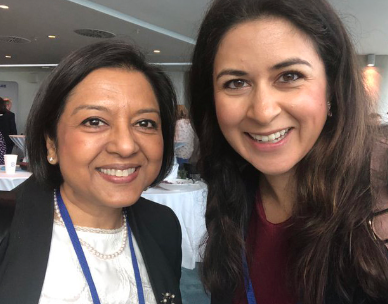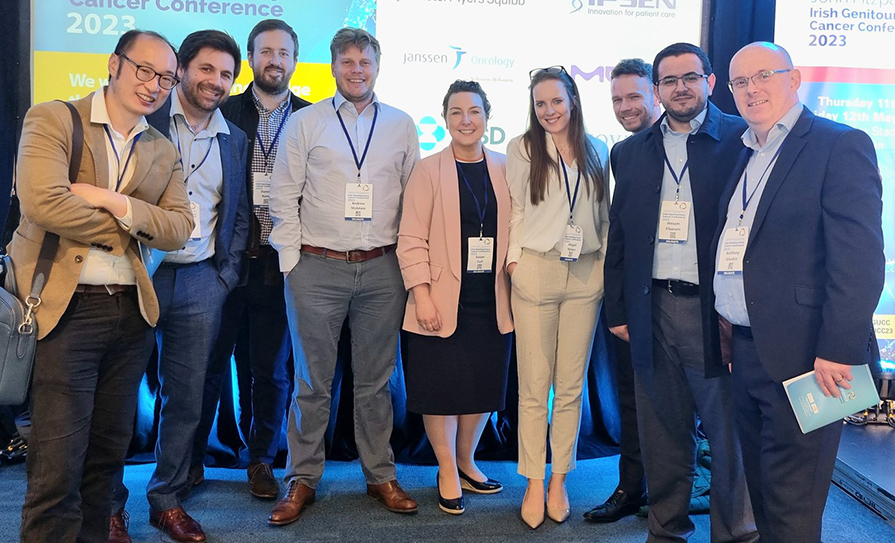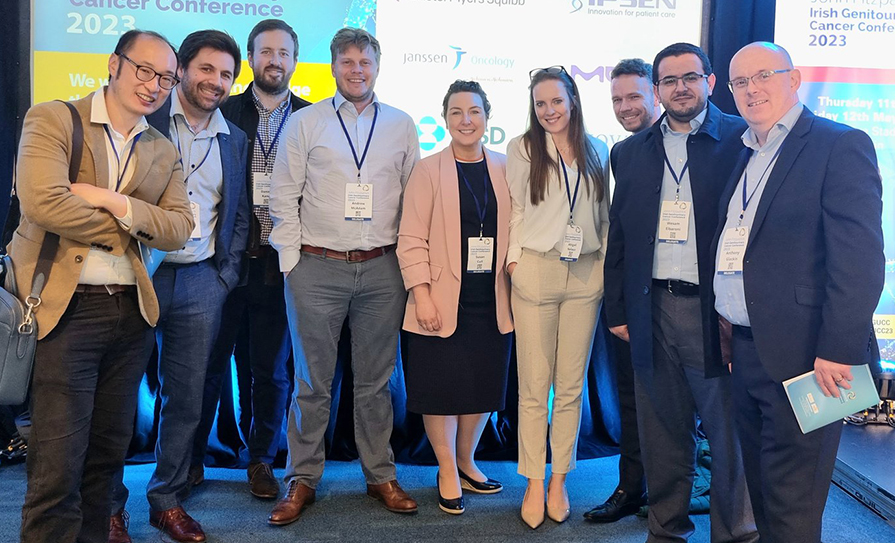The John Fitzpatrick Irish Genitourinary Cancer Conference (JFIGUCC) first began as a prostate cancer conference in 2015, and this year has proven itself to be a world-class symposium in cancers of the prostate, bladder, and kidney.
This year’s event took place in the Aviva Stadium, Dublin, on 11 and 12 May. Delegates were provided with an esteemed international and national faculty, delivering the latest evidence-base in some genitourinary cancers. Speakers from a range of cancer backgrounds – including urologists, radiation oncologists, medical oncologists, nursing, pathologists, radiologists, researchers, and indeed patients – engaged delegates over the two-day event.
The conference is of course dedicated to the memory of the late Prof John Fitzpatrick (1948-2014), Professor Emeritus of Surgery, University College Dublin, Consultant Urologist and Chair of the Department of Surgery at the Mater Misericordiae University Hospital in Dublin. Prof Fitzpatrick was known as an esteemed research mogul, a gifted surgeon, and charismatic colleague who greatly contributed to the field of urology, and whose impact was notable, both at home and abroad.
Day One
Prof Risteárd Ó Laoide, National Director of the HSE National Cancer Control Programme (NCCP) offered a warm welcome to the national and international delegates and faculty.
The first session was chaired by Mr Frank O’Brien, Consultant Urologist; and Dr Richard Bambury, Consultant Medical Oncologist, both of Cork University Hospital.
Following the welcome address, the conference organisers admirably chose Irish patient advocate Mr Martin Sweeney as the first speaker of the conference. This perhaps lent well to ensuring delegates were reminded of those at the heart of cancer services and cancer research – the patients. Mr Sweeney spoke of his experience with prostate cancer, which was delivered with great honesty and provided a real insight into the patient journey. The advocacy work of patients looking after patients via LEAP (Lived Experience Advisory Panel), a group he chairs, was elucidated – namely that a panel of patients provide a focus of research for the Irish Prostate Cancer Outcomes Research (IPCOR) group.
Prof Suzanne Chambers, Professor of Psychology at the Australian Catholic University in Brisbane, Australia, next delivered the disconcerting facts behind the psychological impact of a prostate cancer diagnosis on patients, including an increased risk of death by suicide. Is this an overlooked issue? Highlighted were those at increased risk of distress, including patients diagnosed at a younger age, those with a lower income and education, an advanced disease stage, multiple comorbid diagnoses, and those without a partner at the time of their diagnosis. Higher early distress can predict later ongoing distress. Furthermore, she outlined the psychological impact of erectile dysfunction in treated prostate cancer patients, and suggested to providers that a practical approach to screening men at risk of significant distress can be used, via utilisation of the prostate cancer distress tool and referral to psychological care services where indicated.
Commendably, during her visit to the JFIGUCC, Prof Chambers also delivered a dedicated session to the Irish Association of Urology Nurses on psychosocial care for men with prostate cancer.
Delegates were then treated with a discussion on the evergreen topic of biochemical markers and imaging after a prostate cancer diagnosis, from none other than the winner of the 2015 American Urological Association Gold Cystoscope, Prof Matthew Cooperberg, Professor of Urology, University of California, San Francisco, US. He won this accolade for highly successful and outstanding contributions as a clinician-scientist in prostate cancer and health services research, and his contribution to this meeting was exceptional.
An audience favourite from this lecture was his quote from Will Rogers – a metaphor when discussing PSMA PET (prostate-specific membrane antigen positron emission tomography). “When the Okies left Oklahoma and moved to California, they raised the average intelligence level in both states”. Wonderful technology, but have outcomes changed?
Changing approaches
The move was then made to bladder cancer, with the world-renowned Prof Sophia Kamran discussing trimodal therapy (TMT) in muscle invasive bladder cancer (MIBC). Prof Kamran is an Assistant Professor of Radiation Oncology at Harvard Medical School and Radiation Oncologist in Massachusetts General Hospital, Boston, US. She noted that regarding functional outcomes,
TMT did seem to demonstrate an improved quality-of-life over cystectomy for these patients, but of course, controversies remain.

Dr Priti Lal and Dr Sophia Kamran
The Director of Genitourinary Pathology in the University of Pennsylvania, US, Dr Priti Lal, served up an overview of molecular concepts and taxonomies in urothelial carcinoma. Basal MIBC has worse outcomes, but molecular subtyping will predict response and impact treatment options for patients in the future. This is of particular importance in this cancer, given the number of patients who are ineligible for traditional platinum therapies.
Overdiagnosis?
Prof Scott Eggener, Director of the High Risk and Advanced Prostate Cancer Clinic and Professor of Surgery at the University of Chicago, US, delivered the feisty-titled ‘Public Health Would Dramatically Improve if Gleason 6 (Grade Group 1) Weren’t Called Cancer’. His arguments for the proposal of calling this disease ‘something else’, includes the persistent over-screening, over-diagnosing, and over-treating the disease, and he asserted that the economic cost of Grade Group 1 prostate cancer (diagnosis, surveillance, treatment) is expensive, and it can be torture for patients. He included the fact, that in all his time dedicated to prostate cancer research, he is not aware of any patient ever having symptoms, a metastasis, or dying from pure Grade Group 1 prostate cancer. He argued that individual and public health would improve dramatically if it were not called cancer. Counter-arguments he commonly meets are ‘just do active surveillance’, the fact that the tumour microscopically meets the definition of cancer, concern regarding compliance of patients when non-cancer terminology is used, and the fact that a significant proportion of these men unknowingly have higher-grade disease. He is not buying these arguments and had the figures to back it up. His summary: The reduction of the burden on patients would be enormous. Will it happen though? The @JFIGUCC twitter account ran a poll that day and 43 per cent were for his proposal to not call the disease cancer, with 24 per cent choosing to keep the current terminology.
Latest learnings
Returning to Irish faculty, Prof Jack Gleeson, Medical Oncologist, Cork University Hospital, gave the first conference lecture on kidney cancer and discussed the goals of adjuvant therapy: Select patients at high risk of recurrence; therapy should show efficacy even with low disease burden; low therapy burden (cost, schedule, administration); low toxicity; and improve survival. Half of patients have disease recurrence post-operatively – are checkpoint inhibitors the answer?
There followed the first panel discussion of the conference. This discussion on prostate cancer cases was chaired by one of the event organisers, Dr Daniel Cagney, Radiation Oncologist in the Mater Private, Dublin.
The second session of the day was chaired by Ms Louise McLoughlin, Consultant Urological Surgeon, St James’s Hospital, Dublin; and Dr Richard Moore, Radiation Oncologist, Mater Private Network.
A move was made back to lecture format, and Irish-trained Dr Yasser Ged, Assistant Professor of Oncology in the Department of Genitourinary Oncology, Johns Hopkins University, US, provided the science on the search for biomarkers to predict immunotherapy response for renal cell carcinoma. Gene expression signatures appear to be the best predictors of survival.
Then Prof Girish Kulkarni, Urologic Surgeon, Princess Margaret Cancer Centre and the University of Toronto, Canada, gave an insight to the world of artificial intelligence (AI) in urology and in urothelial carcinoma. These systems utilise complex mathematics to assist research, and genitourinary cancer care teams need a knowledge-base on their mechanisms, as AI is here to stay.
Prostate cancer and the surgical role for high-risk localised prostate cancer was discussed by Prof Prasanna Sooriakumaran from the Cleveland Clinic, London. He concluded that we have level 1 evidence for radiotherapy with systemic therapy, but more years are needed to confirm the role for surgery in this patient cohort. Observational data suggests that surgery can be performed safely and with excellent outcomes in favourable patients, even in node-positive settings. Furthermore, the STAMPEDE (Systemic Therapy in Advancing or Metastatic Prostate Cancer: Evaluation of Drug Efficacy) trial has confirmed the utility of radiotherapy in oligo-metastatic patients, but there is no RCT data assessing the equivalence or superiority of radical prostatectomy instead of radiotherapy for local treatment.
Delegates were then treated to a talk from the ever charismatic radiation oncologist Prof Paul Nguyen of Harvard Medical School and Dana-Faber/Brigham Cancer Institute in Boston, US, who spoke about high-quality radiotherapy for high-risk prostate cancer. It was his first time speaking at the JFIGUCC and his expertise and professionalism were widely welcomed. It was inspiring to hear that Irish data from IPCOR was being used for international high-risk prostate cancer studies.

Delegates at the 2023 JFIGUCC
Guest lecturer Prof Grant Stewart, Professor of Surgical Oncology, University of Cambridge, UK, next delivered the Royal College of Surgeons of Edinburgh King James IV Professorship Lecture. He opened with an outline of what he termed the ‘Cambridge Urology Celtic Line of Succession’, referencing wonderful training both given and received by urologists in Cambridge – including urologists David Neal, John Kelly, Kevin O’Connor, Frank O’Brien, and Stephen Connolly. He outlined his work on kidney cancer screening and posed the question – Does renal cell carcinoma meet the screening criteria as set out by Wilson and Junger? His summary suggests it does, with more data needed on whether case-finding as a continuous process would be economically viable.
He was followed by the above-mentioned Celtic urologist Prof John Kelly, Chair of Uro-Oncology, University College London Hospital, UK. Prof Kelly spoke on the previously contentious issue of robotic cystectomy being the new standard of care for MIBC. Is this still contentious?
There followed another panel discussion on bladder cancer, chaired by Mr Greg Nason, Consultant Urologist, Mater Misericordiae University Hospital, Dublin.
Day two
The second day of proceedings began with a session chaired by Mr Peter Lonergan, Consultant Urologist, St James’s Hospital, Dublin; and Dr Nick Mayer, Consultant Histopathologist, Cork University Hospital.
Mr Tom Walton, Consultant Urological Surgeon, Nottingham City Hospital, UK, commenced the session with a discussion on PSMA PET imaging, and posed the question ‘Should we be restricting access to this tool?’ Of course, like many diagnostic tools, there are issues including capacity, cost, regulation and of particular importance for this tool – radioisotope production. For that reason demand significantly outweighs supply. However, this modality is accurate, and it will change management, but its impact on outcomes needs more data. It was particularly interesting for those locals in the audience to see that Ireland, through the NCCP, has guidelines for PSMA PET use for primary staging in prostate cancer, unlike our neighbours in the UK (NICE) or in Europe (EAU).
We then moved to a look at therapeutic lutetium PSMA. Prof Martin O’Connell, Consultant Radiologist, Mater Misericordiae University Hospital, Dublin, and the Irish Nuclear Medicine Association described their fascinating journey developing this therapy at home in Ireland, with assistance from neighbours abroad including the UK and Germany.
Dr Priti Lal returned to the podium and presented an overview of urothelial cancer subtypes and divergent differentiation. She explained the broadening of the World Health Organisation (WHO) classification book in modern times.
Prof Matthew Cooperberg also revisited the microphone and gave an update on active surveillance (AS) in prostate cancer: We must still strive to “avoid damage to turtles whilst chasing rabbits”. The rate of patients in the US who do not get active treatment on diagnosis is 60-to-80 per cent. He insists that even ‘at-risk’ patients should be considered for AS, as “a delay can be okay”.
Prof Alison Birtle, Clinical Oncologist in Lancashire Teaching Hospital, UK, discussed the modern take on the topic of post-operative systemic therapy for urothelial carcinoma, and revealed what the future might provide for these patients.
DFS benefits with upper tract urothelial carcinoma.
MIBC – checkpoint inhibitors remain an exciting area of research and therapy, but mature data is still needed, especially in the neoadjuvant setting.
Prof Liam Gallagher, a cancer laboratory researcher based in University College Dublin, discussed his group’s work on the development of a novel six-gene signature to help in predicting aggressive prostate cancer.
The next session was chaired by Ms Catherine Dowling, Consultant Urologist and Robotic Surgeon, University Hospital Galway; and Prof Joe O’Sullivan, Professor of Radiation Oncology, Queens University, Belfast.
Patient insight
Staying with faculty based in Ireland, our second patient advocate Mr Brian Egan explained his prostate cancer journey. He brought his inspirational lived experience to a captivated audience, a very well-received patient take on the modern management of this disease.
We were then treated to the return to the podium of Dr Paul Nguyen discussing the very topical issue of salvage radiotherapy in the PSMA era. He asked and answered his objectives, including how to integrate PSMA and how much systemic therapy should be used.
IPCOR’s Mr David Galvin divulged some data from their latest studies. In Ireland, men have a median age of 66 years at prostate cancer diagnosis, and it is a rare diagnosis in those over 80 years. Almost 7,000 patients took part in the study, and 873 questionnaires were received. Ireland had a mean presenting PSA of 7.2 and the majority diagnosed were ISUP1. For those treated, 14 per cent of surgical patients had significant urinary function issues, and 8 per cent of radiotherapy patients had significant bowel symptoms. There were very significant sexual side-effects noted, and seven-out-of-10 men have not used any treatments for erectile dysfunction after prostate cancer. Mr Galvin explained that the LEAP group have asked that a focus is placed on sexual dysfunction and intimacy in the patient care pathway post-treatment.
Prof Scott Eggener gave a beautiful, honest discussion on the emotional toll of surgical complications. He summarised that those treating patients must develop healthy habits and mitigation strategies and that we must discuss the emotional burden of our jobs with ourselves and with our trainees.
Advanced nurse practitioner (ANP), Mr Robert McConkey, who is based in University Hospital Galway, spoke on the role of the ANP in non-MIBC. He explained the arduous journey the patient takes and the breadth of the ANP’s role in caring for the patient, and the service, throughout
this journey.
Staying in Ireland, Dr Lynda Corrigan, Consultant Medical Oncologist, Tallaght University Hospital, Dublin, looked to the novel and emerging treatments for prostate cancer, including agents that target of the tumour microenvironment. The disruption of the androgen receptor remains an active area of research. With some emerging immune treatments, toxicity is a challenge. She maintains that continuing the move to a personalised biomarker approach remains the ultimate goal.
Moving to kidney cancer once more, Prof Grant Stewart, University Of Cambridge, UK, discussed the potential advantages and disadvantages of neoadjuvant chemotherapy. Potential advantages include survival advantage, downstaging of the disease and allowing an understanding of biology. Potential disadvantages include toxicity (itself, and potentially delaying surgery), missing the curative window, and not knowing if a patient is responding to the drug.
The final session of the conference was chaired by Mr Niall Davis, Consultant Urologist; and Dr Adrian Murphy, Medical Oncologist, both of Beaumont Hospital, Dublin. Mr Davis opened with a message of thanks from the family of Prof John Fitzpatrick, to the organisers, delegates and faculty, for honouring their father and husband.
The first speaker of this session was also delivering on the topic of kidney cancer. Dr Kamran returned to discuss the role of SBRT in renal oligometastatic disease. “RCC is radioresistant” is historical teaching, as this is no longer the case in modern treatment pathways. There may also be a role in the future for SBRT in cytoreduction of the primary tumour for those with metastatic disease.
Returning to our faculty from Australia, health psychologist Prof Suzanne Chambers gave a lecture on survivorship care. Once care providers understand the problems that patients have after a prostate cancer diagnosis, we can then move to remedy them in order to give patients the future they need.
Dr Min Yuen Teo, Genitourinary Oncologist, Memorial Sloan Kettering Cancer Centre, New York, US, brought us up to speed on the molecular characteristics of metastatic urothelial carcinoma.
Mr Tom Walton returned to the podium for a look at future perspectives in the management of localised kidney cancer and Prof Girish Kulkarni gave a world-class update on the current science behind treatments for high-risk non-MIBC.
The conference ended with a panel discussion on kidney cancer, in the sunny suburban stadium of south Dublin.
A tremendous success
Credit must be given to the current organising committee, including:
Dr Richard Bambury;
Prof Ray McDermott;
Dr Ciara Barrett;
Ms Catherine McGarvey;
Dr Daniel Cagney;
Dr Richard Moore;
Mr Stephen Connolly;
Mr Greg Nason;
Prof John McCaffrey;
Prof William Watson.
This committee, along with previous event organisers and founding organiser Mr Kiaran O’Malley, are all to be congratulated on what a tremendous success this meeting has become. Tweets from some faculty members summed up many delegates opinions:
- @AlisonBirtle “It’s a wrap. I have genuinely loved everything about the #jfigucc23. Brilliant faculty. Organisation. Programme. But most importantly, the people. Thank you.”
- @lalpritu “Thank you!! Enjoyed speaking @JFIGUCC learned so much and felt like I was amongst friends! I think this was one of the best meetings I have attended and what a beautiful location!”
- @sophia_kamran “Yes! Completely agree – met amazing faculty including
@lalpritu. Thank you for having me! This was a FANTASTIC meeting!!‘
DR AISLING LOONEY, Senior Clinical Fellow in Andrology, University College London Hospital













Leave a Reply
You must be logged in to post a comment.